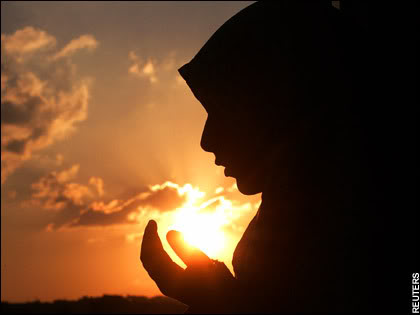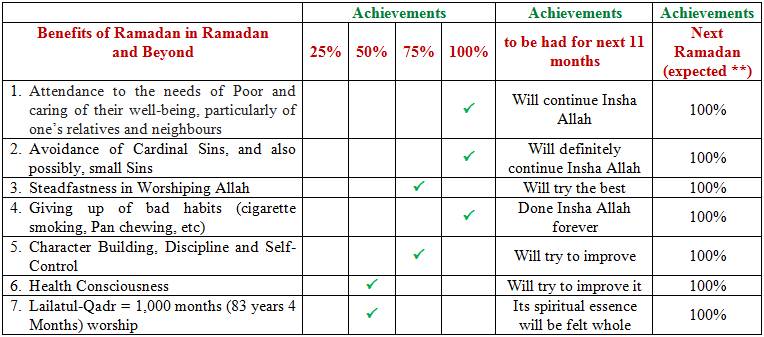
Page-1|Page-2
|
Page-4|Page-5|Page-6
|Page-7
|
Page-8
|
Page-9
|
Page-10
|
BaKhabar  Download pdf Download pdf
|
| OUR
JOURNEY TO THE DAY OF RESURRECTION, PART-XVI - By Gheyas S Mahfoz
Hashmi, Jeddah (hgheyas@albatool.com.sa)
…
Continued from previous
issue.Below are links to all the previous parts for the convenience of readers and those who are seeking Jannah.
In previous issues we have discussed Hisab and Mizan (Deeds Reckoning and its Weighing). The next stage is visiting of the nation of the prophet (pbuh) to Haudh-e-Kauther (River / Pond /Lake / Fountain in Paradise). The successful nation will then visit this lake which has been given to the last prophet (pbuh) as a special blessing. Its water is intensely white more than milk, more delightful than honey, its rim is like stars abundantly illuminating the sky; whoever drinks from it one time will never be thirsty again for all eternity.  The Prophet (pbuh) said, "I am your predecessor at the Kauthar and some men amongst you will be brought to me, and when I will try to hand them some water, they will be pulled away from me by force whereupon I will say, 'O Lord, my companions!' Then the Almighty will say, 'You do not know what they did after you left, they introduced new things into the religion after you” (Bukhari at the authority of Abdullah)  Sahl bin Sa'd: said: I heard the Prophet saying, "I am your predecessor at the Kauthar, and whoever will come to it, will drink from it, and whoever will drink from it, will never become thirsty after that. There will come to me some people whom I know and they know me, and then a barrier will be set up between me and them." Abu Sa'id Al-Khudri added that the Prophet further said: "I will say those people are from me. It will be said, 'You do not know what changes and new things they did after you.' Then I will say, 'Far removed (from mercy), far removed (from mercy), those who changed (the religion) after me! " (Bukhari) Ibn Majah has related in this connection a hadith which contains very pathetic words. The Holy Prophet (PBUH) said: "Beware! I shall have arrived at the Kauther before you and shall pride myself by your means upon the greater numbers of my nation as against other nations. Do not at that time cause my face to be blackened. Beware: I shall have some people released, and some people shall be separated from me. I shall say: O my Lord, they are my companions. He will reply: Don't you know what innovations they introduced after you. According to Ibn Majah, these words were said by the Holy Prophet (pbuh) in his sermon at Arafat. There are many reporting on this subject in books of Hadith. Only few have been quoted, here. Since Bid’a is serious issue and many Muslims are confused with its real understanding, let us have a separate look on it in the next issue Insha Allah.  .....
to be continued, insha-Allah
 |
Am
I not your Lord? - By Shakeel Ashraf (shakeel.ashraf@yahoo.com)  Many a time this is observed that a disbeliever exhibits better human qualities and ethics than a fellow believer. In a society if someone finds that this is not just one of few isolated cases but there are number of such examples, what will be his impression? If he is a disbeliever, he will find reason to assume that Islam is not a good religion. This is where we can understand the importance of our obligation to first be a silent preacher, preaching through one’s good personal qualities and behavior. If a Muslim finds that non-Muslims around him possess better moral values on human standard compared to Muslims what will he think? Here let me share my experience of encounter with a well-qualified person who has been quite involved in interfaith discussions in online forums and in electronic media as a defender of Islam. During a face-to-face discussion with me, he said, non-Muslims are much ahead of Muslims in this world because of their qualities and they may succeed in the life hereafter as well on account of their good deeds. I was shocked to hear “they may succeed in the life hereafter”, that too, from a person of such a high intellect who is known as a defender of Islam. In further talk I felt that his thinking might be based on a logic that since believers as a whole have simply failed to present real Islam to the world, therefore the disbelievers can’t be held responsible for their disbelief. There is no doubt that we will be held responsible for our failures in propagation of true Islam but it won’t at all help acquittal of disbelievers on the day of judgment. Allah hasn’t left any of his creatures unguided. Entire mankind is descendant of Adam Alaihissalam and he was a messenger of Islam. Allah created the ascendant on true path then how can a descendant argue his innocence in going stray? How can a progeny defend his path of falseness if the creator has already guided the progenitor to the truth? Apart from being offspring of Allah’s messenger, mankind has been provided guidance during evolution of civilization through messengers and books till the last messenger (peace be upon him) and the Divine book with him completed the guidance. Allah says in Surah Al Araf (7:172-173): And recall (O Prophet) when your Lord brought forth descendants from the loins of the sons of Adam, and made them witnesses against their own selves. Asking them: 'Am I not your Lord?' They said: 'Yes, we do testify.' We (Allah) did so lest you claim on the Day of Resurrection: 'We were unaware of this.' Or say: 'our forefathers before us who associated others with Allah in His divinity; we were merely their offspring who followed them. And would you destroy us for that which the unrighteous did? Interpretation of the above verse from ‘tafheem -ul- quran’ follows: “The event referred in the verse 7:172, according to several traditions, took place at the time of the creation of Adam. Apart from the prostration of the angels before Adam and the proclamation that man would be Allah's vicegerent on earth, all the future progeny of Adam were gathered, and were endowed with both existence and consciousness in order to bear witness to Allah’s lordship. Both Qur'an & Hadith recount it as an actual happening and affirm that the covenant would be adduced as an argument against man on the Day of Judgment. The verse 7:173 describes that the purpose of the primordial covenant is to make every person responsible for his deeds so that if he rebels against Allah he will be held fully accountable for that rebellion. No one will be able either to plead for acquittal on grounds of ignorance, or blame his misdeeds on his ancestors. This is the reason for the inherent awareness in every person that Allah is the only Lord. Thus, none can absolve himself of his responsibility on the plea that he was altogether ignorant, or transfer the blame for his error to the corrupt environment. However to put man to the test in this word the covenant has been removed from the conscious memory but is preserved in the subconscious mind. The primordial covenant is no different from other pieces of knowledge in man's sub-conscious mind. Whatever man has so far achieved in the way of culture and civilization can be attributed to his latent potentialities. All external factors and internal motivations simply account for helping the actualization of those potentialities. Neither education nor training nor environmental factors can bring out anything which is not potentially found in the human mind. Likewise, external factors have no power to root out man's latent potentialities. External factors may, at the most, cause a person to deflect from the course dictated by sound human nature. However, man's sound nature is inclined to resist the pressure of external forces and exert itself in order to find an outlet. This is not specific to man's religious propensity alone, but is equally true of all his mental potentialities. In this regard the following points are particularly noteworthy: 1) All man's potentialities exist in the sub-conscious mind and prove their existence when they manifest themselves in the form of human action. 2) The external manifestation of these potentialities requires external stimuli such as instruction, upbringing and attitudinal orientation. 3) Man's inner potentialities can be suppressed both by false urges within him as well as external influences but these potentialities cannot be totally rooted out. The same holds true of man's intuitive knowledge regarding his position in the universe and his relationship with his Creator. Man has always had such intuitive knowledge, which required external stimuli through Prophets and Divine Books. This is the reason Qur'an has been designated as mudhakkir (the reminder). The Prophets and Heavenly Books do not seek to provide human beings with something new, something that exists outside of them. Their task rather consists of bringing to the surface and rejuvenating what is latent, though dormant, in man himself. Forces of ignorance, lust, bigotry, and teachings of devils have always attempted to suppress, conceal, and distort the fact that the truth preached by the Prophets is embedded in man's soul. These attempts gave rise to polytheism, atheism, religious misdirection and moral corruption. Despite the efforts of the forces of falsehood, this knowledge has always had an imprint on the human heart. Hence, whenever any effort was made to revive that knowledge, it has proved successful. On the Day of Resurrection Allah will revive in man the memory of the covenant and will provide evidence that the covenant always remained imprinted on man's soul. Man will no longer be in a position to justify his false claims. In the words of the Qur'an: '...and they will bear witness against themselves that they had disbelieved' (al-An'am 6: 130).” … Interpretation ends. Finally, I have no hesitation to state that in spite of being blessed with desired human qualities by his Creator, a disbeliever is a rebellion of His Lord. A believer may be a wrongdoer, still, he can expect forgiveness from his Lord but a rebel convict can’t. A disbeliever having good deeds in his record may get some respite in the intensity of punishment but he will never qualify for salvation and entry to paradise if he remained in disbelief till the end of his life. RAMADAN CHECK-LIST - By Gheyas S Mahfoz
Hashmi, Jeddah (hgheyas@albatool.com.sa)
Hope our
brothers in Islam did their best this Ramadan to get Allah’s
Forgiveness, Mercy and Salavation, and hopefully same enthusiasm will
continue. Ramadan is not just merely a holy month, and fasting therein
is not just abstention from foods and drinks. It is a month of physical
and spiritual training. It is the month of refreshing courses to keep
the Muslim refreshed for remaining 11 months. Following is the
check-list of what we have got and what we have lost, during this
Ramadan, and how much we can expect from this Ramadan’s training during
our next 11 months. Please evaluate your action done in Ramadan and
also check its effects month-wise for the next 11 months till you see
Insha Allah another Ramadan with more dedicated action. For info, a
Muslim has evaluated himself and has put his remarks as below in the
Check-list (Click on the image to view a larger, readable size): 
|
|
3
Home
| About
Us | Objective
| Scholarship
| Matrimonial
| Video
Library | Projects | Quran
Resources | Lend
a hand
|